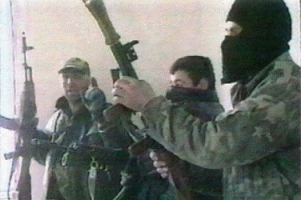'We funded these people, as long as they were killing Russians'
The West pays for double standards with its citizens' lives

Some 6,000 police officers are patrolling today the streets of London and the capital's subway system a month after four bombs killed 52. The massive security operation is intended to reassure the public four weeks on from the deadly July 7 attacks on three subway trains and a central London bus, and the failed July 21 attacks that followed. 
Officials stressed there was no specific intelligence of a third attack, but undercover police were mingling with passengers, and officers were armed with automatic rifles and pistols. Police helicopters hovered above while traffic was heavier than normal, the Associated Press reports.
"It's a little bit eerie," said Rosalyn Cooper, 23, before she got on the Tube. "You can't help thinking about when it will happen again."
"This is a major threat and we are doing everything we can, both covert and undercover policing, to try to stop another attack," said Deputy Chief Constable Andy Trotter of the British Transport Police. "There is no specific intelligence but we are still at a very high level of alert in London," he added. "It's four weeks on from the first attack and this operation today is to reassure Londoners."
Quite remarkably, on the same day security has been stepped up in the Russian war-torn republic of Chechnya due to rumors of potencial attacks believed to be planned around the anniversary of the major rebel offensive in 1996.
The Interior Minister in Chechnya's Moscow-backed government, Ruslan Alkhanov, said that security has been tightened for the period of Aug. 4-10 because of "provocative rumors that disturb the populace".
Alkhanov said police patrols have been stepped up and security tightened at key facilities including pipelines, power plants and bridges. Police are forbidden from taking vacation or days off for the time being, he said.
Russian and Chechen authorities have traditionally increased security ahead of the anniversary of an Aug. 6, 1996 assault on the capital Grozny, which turned the tide in the rebels' favor in the first of two separatist wars in the region in the past decade.
This coincidence brings up the emotional confession made by London Mayor Ken Livingstone in the aftermath of the British capital's 7/7 inferno. Livingstone blamed western policies for contributing to the spread of the extremist beliefs that inspired the London bombers. The mayor of London highlighted the West's role in the creation of al-Qa'eda by saying: "We created these people. We built them up. We funded them."
Mr Livingstone was quoted by the Associated Press as saying: "This particular strand of extremism was funded by the West in Afghanistan. Osama bin Laden was just another businessman until he was recruited by the CIA.
"I suspect the real problem was that we funded these people, as long as they were killing Russians. We gave no thought to the fact that when they stopped killing Russians they might start killing us."
This vision of the geopolitical situation is unique for a Western politician. As a person, who has lived for years in the West, I know that the general public in Western countries follow their politicians and media outlets and will not hesitate to say that courageous Chechen rebels fight with blood-thirsty Russian colonizers. 9/11 attacks have not changed much at this point. Western newspapers referred to terrorists as 'rebels,' 'insurgents,' and 'dissidents' even during last year's horror of the hostage crisis in the school of the city of Beslan.
Let's leave aside moral aspects of the Western perception of Russian events. It is much more important to think of the following: Western security agencies and special services currently exercise an impressive ability to cooperate. They are doing very well working together, exchanging information and using other methods necessary for successful struggle against global terrorism. Police is arresting suspects of London bombing in the British capital as well as in different European cities on a daily basis.
At the same time, however, the West continues supporting Islamic terrorists in Russia directly and circumstantially. The interview with the notorious Chechen warlord Shamil Basayev to the U.S. TV channel ABC became one of the latest manifestations of such support. It is noteworthy that the Foreign Affairs Ministry of Russia deprived ABC of its accreditation in Russia after the interview had been aired in the USA.
Once again, let's leave aside the moral aspect of the issue, to me it's obvious. Consider this: Western politicians and media are facing a simple dilemma now: whether they wage war on global Islamic terrorism, or continue following the Cold War stereotypes and fighting Russians indirectly. The choice determines the number of lives that the West will sacrifice to the global war, which historians will be able to refer as the World War III.
Stanislav Varykhanov
Subscribe to Pravda.Ru Telegram channel, Facebook, RSS!

